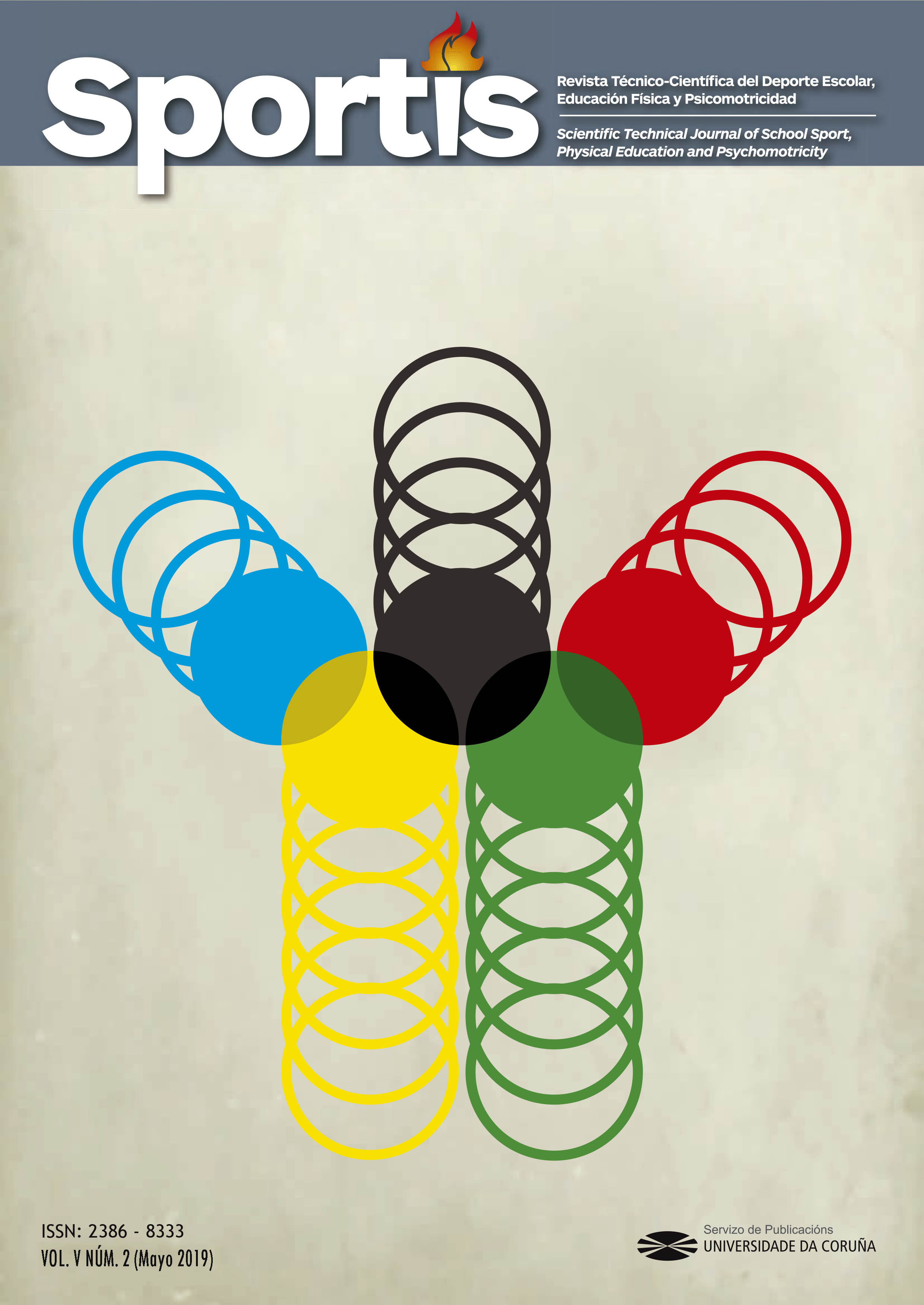Fortnite EF, a new sports game for the Physical Education classroom. Innovation and gamification proposal based on the Fortnite video game
Main Article Content
Abstract
The Physical Education classroom becomes an optimal setting for the work of multiple contents that positively affect the social, affective, emotional, psychic and physical development of the students. Gaming, videogames and innovation can be a good way to improve the learning of curricular contents in students. Through this innovative and gamification proposal, Physical Education teachers are offered a didactic adaptation of the successful and famous video game Fortnite, a video game that has attracted the attention of millions of players around the world, especially children and adolescents. A new sports game called Fortnite EF is created for this purpose. Its objective is to work on different contents of the primary and secondary education curriculum, boosting motivation and enjoyment in sports practice, preventing violent behaviour and working on different values. It presents the complete development of the didactic proposal and develops a methodological approach to research based on the collection of data through questionnaires passed on to future university teachers. The results confirm a greater motivation towards the practice of sport, a better work of values and prevention of violent behaviours during the game as well as an innovative way of working different contents of the curriculum through a new sport game, being defined by the participants in the study as very intense, dynamic, fun and stimulating as well as affirming close to 95% of those surveyed that it is a fast game, full of stimuli and with a high level of motor commitment.
Keywords:
Downloads
Article Details
References
Adams, B., Raes, A., Montrieux, H., & Schellens, T. (2018). “Pedagogical tweeting” in higher education: Boon or bane? International Journal of Educational Technology in Higher Education, 15(1). https://doi.org/10.1186/s41239-018-0102-5
Contreras Espinosa, R. S., & Eguia, J. L. (2016). Gamificación en aulas universitarias. Barcelona: Universidad Autónoma de Barcelona.
Correa García, R. I., Duarte Hueros, A., & Guzmán Franco, M. D. (2017). Horizontes educativos de los videojuegos. propuestas y reflexiones de futuros maestros y educadores sociales. Educar, 53(1), 67-88. https://doi.org/10.5565/rev/educar.849
Craft, A., Hall, E., & Costello, R. (2014). Passion: Engine of creative teaching in an english university?. doi://doi.org/10.1016/j.tsc.2014.03.003
de Aldama, C., & Pozo, J. (2019). Do you want to learn physics? please play angry birds (but with epistemic goals). Journal of Educational Computing Research. https://doi.org/10.1177/0735633118823160
de Freitas, S. (2013). Learning in immersive worlds: A review of game-based learning. Bristol: Joint Information Systems Committee.
Deterding, S., Khaled, R., Nacke, L. E., & Dixon, D. (2011). Gamification: Toward a definition. Chi. https://doi.org/10.4000/sdj.287
Epic Games. (2017). Fortnite | battle royale. Retrieved from https://www.epicgames.com/fortnite/es-ES/buy-now/battle-royale.
Gómez-Gonzalvo, F., Molina, P., & Devís-Devís, J. (2018). Los videojuegos como materiales curriculares: Una aproximación a su uso en educación física; Retos. Nuevas Tendencias En Educación Física, Deporte Y Recreación, (34), 305-310. https://doi.org/10.22456/1982-8918.71277
Hortigüela Alcalá, D., & Pérez Pueyo, Á. (2015). Uso de las redes sociales como elemento formativo en el aula: Análisis de la motivación del alumnado universitario. Revista ICONO14 Revista Científica de Comunicación y Tecnologías Emergentes, 13(2), 95-115. https://doi.org/10.7195/ri14.v13i2.788
Huizinga, J. (1984). Homo ludens. Madrid: Alianza.
Jiménez Jiménez, F. (2011). Análisis estructural de las situaciones de enseñanza en los deportes colectivos. Acción Motriz, , 39-57.
Marín-Díaz, V., Morales-Díaz, M., & Reche-Urbano, E. (2019). Educational possibilities of video games in the primary education stage according to teachers in training. A case study. Journal of New Approaches in Educational Research, 8(1), 42-49. https://doi.org/10.7821/naer.2019.1.330
Ministerio de Educación, Cultura y Deporte del Gobierno de España. (2014). Real decreto 126/2014, de 28 de febrero, por el que se establece el currículo básico de la educación primaria. Boletín Oficial Del Estado, (52), 1-58. https://doi.org/10.3989/arbor.2014.765n1010
Ministerio de Educación, Cultura y Deporte del Gobierno de España. (2015). Real decreto 1105/2014, de 26 de diciembre, por el que se establece el currículo básico de la educación secundaria obligatoria y del bachillerato. Boletín Oficial Del Estado, (3), 169-546. https://doi.org/10.15517/rge.v4i1.12919
Montes González, J. A., Ochoa-Angrino, S., Baldeón Padilla, D. S., & Bonilla Sáenz, M. (2018). Videojuegos educativos y pensamiento científico: análisis a partir de los componentes cognitivos, metacognitivos y motivacionales. Educación y Educadores, 21(3), 388-408. https://doi.org/10.5294/edu.2018.21.3.2
Mora Teruel, F. (2014). Neuroeducación. Madrid: Alianza.
Morales, E. (2009). El uso de los videojuegos como recurso de aprendizaje en educación primaria y teoría de la comunicación. Diálogos de la Comunicación, (78), 1-12. https://doi.org/10.4185/rlcs-2018-1315
Persico, D., Passarelli, M., Dagnino, F., Manganello, F., Earp, J., & Pozzi, F. (2019). (2019). Games and learning: Potential and limitations from the players’ point of view. Paper presented at the Lecture Notes in Computer Science (Including Subseries Lecture Notes in Artificial Intelligence and Lecture Notes in Bioinformatics), 134-145. https://doi.org/10.1007/978-3-030-11548-7_13
Pierre, P. (1981). Contribution á un lexique commenté en sicience de l’action motrice. París: Institut National Du Sport Et De L'education Physique.
Pierre, P. (2018). Une pédagogie des compétences motrices. Acción Motriz, (20), 89-96.
Planchart, S. C. F., Reina, M. F., Padrón, N. D. P., Montero, M. E. M., & Ferrer, E. E. C. (2018). La gamificación como herramienta en el trabajo docente del orientador: Innovación en asesoramiento vocacional desde la neurodidáctica. Revista Iberoamericana De Educación, 78(1), 165-182. https://doi.org/10.5944/ried.2.11.930
Quintero González, L. E., Jiménez Jiménez, F., & Area Moreira, M. (2018). Más allá del libro de texto. La gamificación mediada con TIC como alternativa de innovación en Educación Física. RETOS, (34), 343-348.
Rodríguez Fernández, J. R. (2018). Reseña de la obra innovando la docencia desde la formación del profesorado. Enseñanza & Teaching: Revista Interuniversitaria De Didáctica, 36(2), 217-219. https://doi.org/10.14201/et20163413555
Rueda, R. A. S. (2018). Perspectivas de los estudiantes sobre la inclusión de videojuegos en el aprendizaje. IJERI: International Journal of Educational Research and Innovation, (10), 163-178.
Schulz, T. (2016). ¡Sé creativo! el jefe de innovación de google sabe cómo. Retrieved from https://www.xlsemanal.com/actualidad/20160719/se-creativo-jefe-innovacion-google-sabe.html
Schunk, D. H. (2012). Learning theories. an educational perspective (6ª ed.). Boston: Pearson.
Silvero Miramón, M. (2006). Motivación y calidad docente en la universidad de. Pamplona: Universidad de Navarra.






